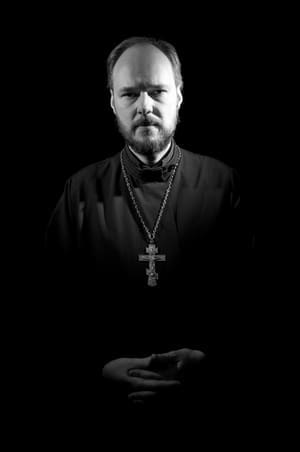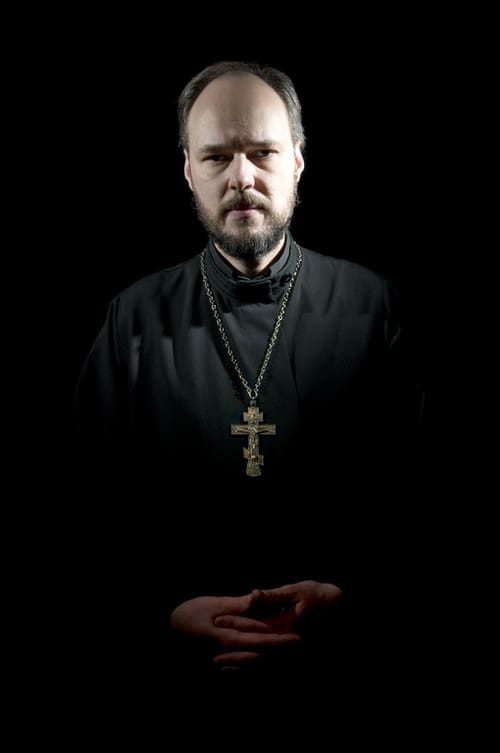 Father Geoffrey Korz is an Orthodox Christian priest in Hamilton, Ontario. Prior to ordination, he worked in advertising, served in local elected office, worked as a political staff at the Ontario Legislature, and enjoyed six years teaching religion and philosophy at the secondary level.
Father Geoffrey Korz is an Orthodox Christian priest in Hamilton, Ontario. Prior to ordination, he worked in advertising, served in local elected office, worked as a political staff at the Ontario Legislature, and enjoyed six years teaching religion and philosophy at the secondary level.
He is married with two children, likes animals (but has no pets), and has no use for cell phones.
In your work, what are you creating, and what are you cultivating? (In Andy Crouch’s vernacular, what new culture are you making, and what good culture are you conserving and nurturing?)
Geoffrey Korz: Saint Vincent of Lerins tells us that true Christianity is that which has been believed and practiced “everywhere, always, and by all.” The labour of an Orthodox Christian priest in the parish and in the community at large must endeavor to preserve all that which is good and true, as testified to those who are revealed to us as living whole and holy lives have attested. The life of the historic Orthodox Church has always been a struggle to acquire the fullness of the Likeness of God, which was lost to the whole world in the fall. This struggle must begin first and foremost with ourselves, by acquiring what Saint Seraphim of Sarov calls the spirit of inner stillness—the quieting of the passions—that we may then have the grace of God to offer to those around us.
These passions include ambition, greed, acquisitiveness, intellectualism, and fleshly desires; until we conquer them in ourselves, we have little to offer to other people besides our own proud talk. Once we begin the authentic spiritual lives in the pattern of God’s holy ones, we can then influence our own families, our co-workers and fellow students, our neighbours, our communities, and the whole world with acts of reconciliation, mercy, love, and spiritual health and healing.
Who is the “public” for your work—who is it for, and how does it affect the lives of those who engage with it?
For an Orthodox Christian priest, the primary “public” are those in the immediate vicinity: those in the parish community who have committed themselves to the same spiritual struggle of the Christian life, and who are endeavouring—however successfully or unsuccessfully—to overcome their own passions. Secondarily, the “public” is the world beyond the Communion of the Faithful, which includes anyone whom we encounter in our lives who has some degree of willingness to struggle to reacquire true humanness. We are cautioned very specifically in the writings of the Desert Fathers of Egypt that we should not immerse ourselves in the lives of those who have no interest in at least trying to fight the good fight of the spiritual life in Christ: this is a danger to all involved, since we are in no position to force ourselves on the unwilling, nor are they in a position to benefit from anything we might offer.
Why do you do what you do?
Those who consistently make an effort to live true, holy Christian lives eventually come to the conclusion that it is not just the world that is in a mess—it is me that is in a mess. When we start to see our own sins reflected in the brokenness and sin of the world, that is the point at which we begin to have some compassion for people. After four short decades of life, I think I am beginning to see this: if I am not merciful to other people, God will simply not be merciful to me, in my pride.
It is very easy to confuse mercy with permissiveness—this confusion must be avoided at all costs. Today, unfortunately, Christianity has two false faces: the first is a strong but angry and uncaring face, while the second is a sweet, saccharine, permissive face. Neither one is Christian. We simply don’t see this in the lives of saints (contrary to the fake images on some stained glass windows!). A holy life of humility and repentance is accompanied by strength of character, gentleness, and a clear embrace of speaking the truth. The martyrs were (and are) heroes. We see this is the faces of the icons of the Church, seen in the catacombs from the earliest times: the martyrs are bold and strong, but also loving and peaceful.
It is a striving for this, and a labour for this self-understanding and love for others that makes me do what I do, at least most of the time.
What skills, proficiencies, and virtues does this work develop in you?
On a human level, the work of an Orthodox Christian priest requires a wide spectrum of characteristics. One must be able to deal with a variety of cultures, both older Christian cultures, and more secular Canadians. Since Orthodox Christianity is proportionately the fastest growing Christian group in Canada, one must have ready at any moment an account of the faith that we hold—not just good arguments and answers, but the story that connects inquisitive people to eternal things, to the experience of God.
On a spiritual level, this requires very honest humility. Some people who do pastoral work really believe that they can do some good, that they can heal people or put their life on a solid path, if the subject will simply confess their belief. This is pride. We can do nothing, except pray for people, and offer them what we have, by way of answers to their questions and situation. Only God can help us. This is a critical truth to embrace, not just in pastoral work, but in business and education as well. Utopianism should have no part in the life of a Christian—it is a lie, built on human ambitions, apart from God. It is the Tower of Babel. If we are spending our worldly skills building towers like this, we are wasting our time.
What five books would you recommend to someone interested in understanding or pursuing the sort of work you do?
My wife always says that any Christian should read the book Unseen Warfare by Saint Theophan the Recluse. A very readable precursor to this is C. S. Lewis’ The Screwtape Letters, which provides a very vivid understanding of all the “noise” that troubles our thoughts in the Christian spiritual life. It is very insightful and readable. Some have said that if C. S. Lewis were alive today, he would be an Orthodox Christian, and I think they might be correct.
I have personally been very much inspired by Father Seraphim Rose: His Life and Works, which tells the life of a very regular American man who came to know the emptiness of western existence, and to find the fullness of the Christian life in Russian Orthodox Christianity. As a missionary priest (and don’t kid yourself—any Christian in North America is working in missionary territory), I’ve also been inspired by the book Apostle to Zaire, on the life of a missionary named Father Kosmas, who worked among and baptized thousands of people who lived in great poverty, and under very oppressive spiritual conditions. He was always bright, welcoming, and hopeful—we need that.
On a day-to-day level, I read The Prologue from Ochrid, which is a combination of short commentaries on the Bible, along with vivid lives of the saints, presented in the form of daily readings. Apart from the Bible itself (which I did not include on my list—it’s just a given that it would be part of daily reading for a faithful person), The Prologue from Ochrid is really solid spiritual food. (You can find some other recommendations here.)
What do you do for fun?
As one contemporary monk once said, “fun” is a modern concept—it’s like an appetite that cannot be filled. I try to avoid using the word, but in the spirit of your question, I think one of my great joys is eating a meal with my family and friends. It’s no coincidence that the Church from the beginning had married clergy: our families should be a very basic foundation for joy in our life. Even when there are differences or arguments, there must still be love and joy.
I very much like to read a variety of things—certainly spiritual books, but also histories, and theories of social trends. I don’t have much time for fiction, unless it is some kind of epic that speaks to the human condition. I’m a great fan of the science fiction drama Babylon 5, which might surprise you. It is one of those rare epics that tells us a great deal about the human condition, both physical and spiritual.
I would also add that I find teaching to be “fun”. Of course, the scriptures warn us about teaching, that we’ll be judged more strictly, since we can unintentionally lead other people astray, and for that reason I try to avoid speaking or teaching on anything I don’t really know, but if there seems to be something one has to offer to others, especially to younger people, this is a joy. It is really our duty to pass on this torch of the experience of the past. This is the holy tradition the Church Fathers speak of: not some canned proclamation from an imperial throne, but the life experience with the true God, conveyed by the words of holy people. I may never experience it fully, but it is rewarding to convey it to others, as the Canadian poet Dr. John McCrae wrote, “To you from failing hands we throw the torch; be yours to hold it high.” This really sums up the work of a Christian missionary.


